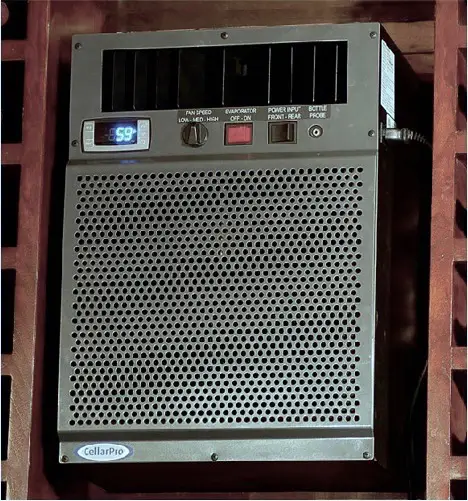You will most likely need a wine cellar cooling unit. Even if you decide to put a cellar in your basement, which may have the properties you’d expect from a wine cellar, you probably will not want to try to get by without a cooling unit. Basements, especially in the United States, can be too warm at times to properly store your wine. It may be the correct temperature… and even the correct humidity during some of the years. However, the fluctuation of temperature and humidity is what can destroy your wine. It will most likely not be stable enough all year round for your wine collection and storage needs.
If you don’t know the type of cellar that will work best in your home, and if you’re confused as to the best type of cooling unit to install, here are a few tips. But keep in mind that specialists and experts can help you decide how best to protect your wine. Most can talk to you on the telephone or come out, look at your home, and advise you on your options. You don’t have to go into this type of project alone, and you probably shouldn’t. When you started collecting wine, you probably talked to someone. Do the same when deciding what type of wine cellar to build or install in your home.
There are many different kinds of cooling units on the market today. Some can be somewhat noisy. Others can be fairly quiet inside your cellar and can be hidden in the racking with a compressor in another room or outdoors. Still, others can be ducted into the room and look similar to an air conditioning vent in the wall or ceiling. Choosing the correct unit that will work for you will depend upon not only the look you want but how your home is built and where the cellar is located in your home. You may not like the need for a cooling unit, but it will help you to be sure your room is climate controlled and your wines safe. Why build a cellar in your home for your wine collection if you’re not going to properly take care of it?
The size of your unit will depend on many factors of your cellar. The cubic footage, the R-value of the insulation used, interior or exterior walls, the type of door used, amount of lighting, etc. A wine cellar specialist can do a heat load calculation for you to determine the BTUs necessary to keep your room at the proper temperature and the size of the unit you will need. Some units are one piece, and some units are two pieces. There are many differences between these types of units. You should install the type of system that will work best for you, depending on the size of your wine cellar, where your wine cellar is located in your home, whether your system is ductless, ducted, or a “through the wall” type of unit.
All wine cellar cooling units have a temperature gauge that helps your cooling unit adjust the temperature (and humidity) inside the wine cellar slowly. Having a digital display is a plus so that you can see at a glance the temperature in the room at any time. If your cellar experiences extreme temperature shifts (and extreme, for wine, could be as few as five degrees in the span of a few minutes), your wine can be affected negatively. Maintaining the humidity and temperature are key ingredients to keeping your wine healthy in your cellar. The correct climate control system will help to ensure that such shifts do not occur.
The correct cooling unit is not just necessary for your wine cellar but a way to ensure you enjoy your wines for years to come.
 />
/>

















